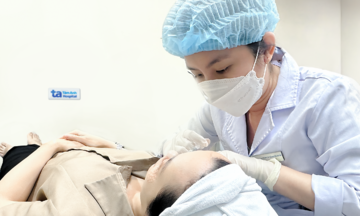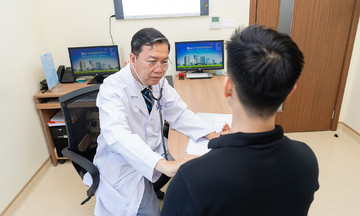Answer:
Hepatitis C (HCV) is a liver disease caused by the hepatitis C virus. Pregnant women infected with HCV have a 4-7% risk of transmitting the virus to their babies during the perinatal period (from the 28th week of pregnancy to the 7th day after birth). This risk may be higher if the mother is also HIV-positive or has a high viral load. HCV is transmitted through blood, not through breast milk, food, water, or casual contact like hugging, kissing, or sharing food and drinks.
 |
Doctor Pham Thi Van Xuan consulting an expectant mother. Photo: Tam Anh General Hospital |
Doctor Pham Thi Van Xuan consulting an expectant mother. Photo: Tam Anh General Hospital
Approximately 30% of infected individuals spontaneously clear the virus within 6 months without treatment, while the remaining 70% may develop chronic HCV infection. Currently, there is no vaccine for hepatitis C. The best way to prevent the disease is to avoid contact with the virus. This includes avoiding sharing items such as needles, syringes, spoons, cotton swabs, razors, and toothbrushes. It is crucial to avoid receiving blood transfusions or organ transplants from donors infected with HCV. Practicing safe sex by using condoms is also essential. Limit tattoos and piercings, and if you choose to get them, ensure the facility is reputable.
Expectant mothers should maintain a healthy lifestyle, manage their weight, and avoid exposure to harmful substances like tobacco, alcohol, stimulants, and chemicals. Regular check-ups are vital for early detection and treatment of liver damage.
Medications like Ribavirin and Interferon are not used during pregnancy due to the risk of birth defects. To prevent transmission to the baby, pregnant women should undergo regular ultrasounds and tests to monitor the pregnancy. Babies born to HCV-positive mothers should be tested for hepatitis C (Anti-HCV or HCV Ab) at 18 months of age. Children with positive Anti-HCV results need an HCV-RNA test after the age of 3 to confirm chronic HCV infection.
MSc. Doctor Pham Thi Huong Giang
Center for Obstetrics and Gynecology
Tam Anh General Hospital, Hanoi
| Readers can submit questions about pregnancy and childbirth here for doctors to answer. |












